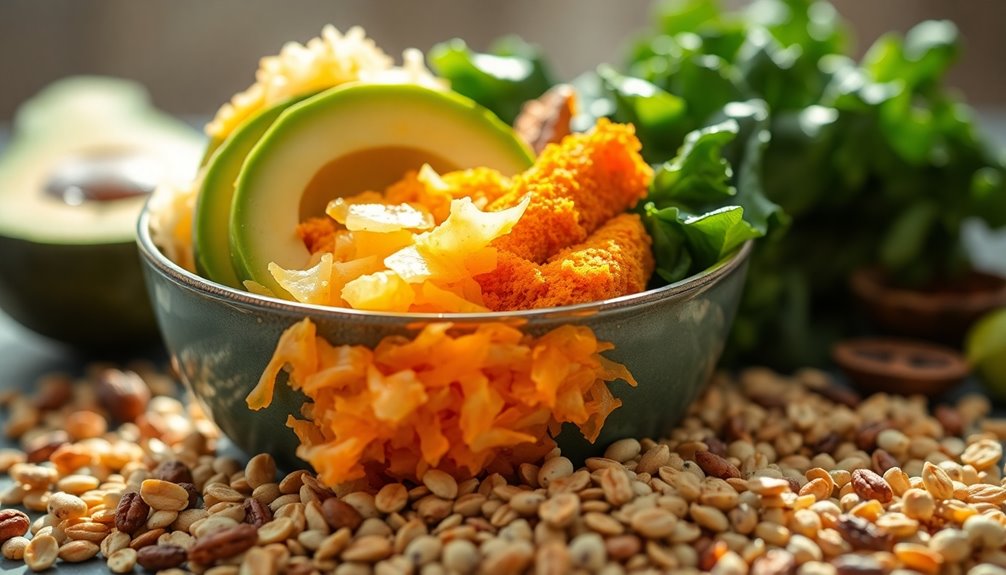Your gut health significantly influences your immune system. Trillions of gut bacteria help digest food and interact with immune cells, promoting a balanced immune response. A diverse microbiome strengthens this connection, acting as a barrier against harmful pathogens. You can enhance gut health through probiotics, fiber-rich foods, and fermented options like yogurt or kimchi. Healthy lifestyle habits, including a varied diet and regular exercise, further support beneficial gut bacteria. Staying well-hydrated also plays a pivotal role. When you prioritize gut health, you're actively boosting your immunity. Keep exploring to discover more about how these aspects impact your overall well-being.
Key Takeaways
- Gut microbiota plays a crucial role in regulating immune responses and protecting against pathogens.
- A diverse microbiome supports a stronger immune system and reduces inflammation levels.
- Probiotics enhance gut health, balance microbiota, and improve overall immune function.
- A healthy diet rich in fiber and fermented foods promotes beneficial gut bacteria and immunity.
- Lifestyle choices, including regular exercise and hydration, significantly impact gut health and immune strength.
Understanding Gut Microbiota

At the heart of your digestive system lies a complex ecosystem known as gut microbiota, which plays an essential role in your overall health. This community of gut bacteria, numbering in the trillions, works tirelessly to maintain a balanced environment. They not only help digest food but also greatly influence your immune response. A healthy gut microbiome can strengthen your body's defenses against pathogens, ensuring you feel your best.
When your gut bacteria thrive, they produce beneficial compounds such as short-chain fatty acids that contribute to gut integrity and immune function. These compounds help regulate inflammatory responses, keeping your immune system in check.
On the flip side, an imbalance in gut bacteria—often due to poor diet, stress, or antibiotic use—can disrupt this harmony, leading to increased inflammation and a weakened immune response. This imbalance may also exacerbate underlying conditions such as chronic kidney disease, impacting your overall well-being.
Understanding your gut microbiota can empower you to make choices that support your health. Incorporating fiber-rich foods, fermented products, and a variety of plant-based options into your diet can nourish these beneficial bacteria. By doing so, you're not just caring for your digestion; you're actively supporting your immune health as well.
In this interconnected ecosystem, every choice you make matters. Embracing a lifestyle that nurtures your gut microbiota is a step toward enhanced well-being, fostering a sense of belonging to a community that prioritizes health. Your gut isn't just a part of your body; it's a crucial component of your overall resilience.
The Role of Probiotics

Probiotics play a pivotal role in maintaining gut health and enhancing your immune system. These beneficial microorganisms are vital for balancing your gut microbiota, which in turn supports your overall well-being. Different probiotic strains offer various benefits, helping to create a diverse and resilient gut environment. Research shows that a healthy gut can positively influence the gut-brain axis, affecting not just digestion but also mood and cognitive function.
Incorporating probiotics into your diet can help you:
- Promote a balanced gut microbiome
- Boost your immune response
- Improve digestion and nutrient absorption
- Alleviate symptoms of anxiety and depression
- Support overall mental health
You can find probiotics in fermented foods like yogurt, kefir, and sauerkraut, or as dietary supplements. When choosing a probiotic, it's important to select the right strains for your needs. Lactobacillus and Bifidobacterium are two of the most researched and effective strains known for their immune-boosting properties. Moreover, a diet low in processed foods and high in keto bread alternatives can further enhance gut health and immune function.
It's essential to remember that everyone's gut is unique, and the effects of probiotics can vary from person to person. Hence, it's a good idea to consult with a healthcare professional to find the best approach for you.
How Gut Health Affects Immunity

Your gut health greatly influences your immune system, acting as a frontline defense against pathogens. A balanced gut microbiome helps regulate immune responses, preventing excessive gut inflammation that can compromise your health. When your gut flora is in harmony, it communicates effectively with your immune system through the gut-brain axis, supporting overall wellness. Additionally, high blood pressure can be exacerbated by chronic inflammation in the body, highlighting the importance of maintaining a healthy gut.
Understanding the relationship between gut health and immunity is pivotal. Here's a brief overview of how gut health impacts your immune system:
| Factor | Impact on Immunity | Considerations |
|---|---|---|
| Healthy Microbiome | Enhances pathogen defense | Include fiber-rich foods |
| Gut Inflammation | Can lead to autoimmune disorders | Manage stress and diet |
| Gut-Brain Axis | Influences immune function | Practice mindfulness techniques |
| Probiotics | Support diverse gut flora | Choose high-quality sources |
| Diet Quality | Affects gut health and inflammation levels | Focus on whole, unprocessed foods |
When your gut is inflamed, it can send distress signals that affect your immune response. This means that addressing gut inflammation through proper nutrition and lifestyle choices can be a game-changer for your overall health. By recognizing the connection between your gut and immune system, you empower yourself to take proactive steps. You belong in a community that values health, and nurturing your gut is an essential part of that journey. Prioritize your gut health, and you'll likely see positive changes in your immune resilience.
The Gut-Immune System Connection

The connection between the gut and the immune system is a dynamic relationship that plays a pivotal role in maintaining overall health. Your gut is home to trillions of microorganisms, and these tiny allies help regulate your immune response. When your gut is healthy, it keeps inflammation in check and supports a robust immune system. However, when gut inflammation occurs, it can lead to a weakened immune response, making you more susceptible to infections and diseases.
Here's how your gut influences your immune system:
- Microbiome Diversity: A balanced gut microbiome is essential for a healthy immune response.
- Barrier Function: Your gut lining acts as a barrier, preventing harmful substances from entering your bloodstream.
- Immune Cell Interaction: Gut bacteria interact with immune cells, enhancing their function and readiness.
- Inflammation Regulation: A healthy gut helps control inflammation levels, reducing the risk of chronic diseases.
- Nutrient Absorption: A well-functioning gut absorbs essential nutrients that are crucial for immune health.
Dietary Choices for Gut Health

Making the right dietary choices can greatly enhance gut health, which in turn supports a stronger immune system. You can start by integrating gut-friendly foods into your meals.
Foods rich in fiber, like fruits, vegetables, and whole grains, help stimulate the growth of beneficial gut bacteria. Fermented foods, such as yogurt, kefir, sauerkraut, and kimchi, are also excellent choices, as they introduce probiotics that support a healthy microbiome.
In addition to these foods, you might want to contemplate gut healing supplements. Probiotic supplements can help replenish your gut's good bacteria, especially after antibiotic use or during periods of stress. Prebiotics, found in foods like garlic, onions, and asparagus, can nourish these beneficial bacteria, helping them flourish in your gut.
It's also wise to restrict processed foods, sugar, and saturated fats, as they can disrupt your gut health and weaken your immune response. Staying hydrated is essential too; drinking plenty of water aids digestion and helps maintain a balanced gut environment. Furthermore, adopting a plant-based diet can significantly contribute to improving overall gut health and immunity.
The Impact of Stress

Experiencing stress can greatly disrupt gut health, leading to a cascade of negative effects on your immune system. When you're stressed, your body activates the fight-or-flight response, which can impact the gut-brain axis—a complex communication network between your gut and brain. This interaction can result in decreased gut function, inflammation, and an imbalance in gut bacteria, all of which can compromise your immune defenses.
To illustrate the connection between stress and gut health, consider the following effects:
- Increased inflammation: Stress can heighten the release of inflammatory markers that may harm gut integrity.
- Altered gut microbiota: Stress can lead to a decrease in beneficial bacteria, leaving your gut vulnerable.
- Digestive issues: You may experience symptoms like bloating or constipation due to stress's impact on gut motility.
- Weakened immune response: A disrupted gut microbiome can lead to a less effective immune system, increasing susceptibility to illness.
- Mood disturbances: Stress can contribute to anxiety and depression, which can further exacerbate gut health issues.
Implementing effective stress management techniques, such as mindfulness, exercise, or talking with friends, can help maintain a healthy gut. Additionally, understanding how heart rate variability can aid in self-regulation may further enhance your ability to cope with stress. Remember, taking care of your mental well-being is just as important as nurturing your physical health. By understanding the connection between stress, gut health, and immunity, you can take proactive steps toward a healthier you.
Lifestyle Factors and Gut Health

Maintaining a healthy gut goes beyond managing stress; your lifestyle choices play a significant role too. Research shows that your daily habits directly impact your gut balance, which in turn affects your overall immune health. When you adopt healthy habits, you not only nurture your gut but also create a supportive environment for beneficial bacteria to thrive.
One essential aspect of lifestyle is your diet. Consuming a variety of fruits, vegetables, whole grains, and fermented foods can enhance gut diversity. These foods are rich in fiber and probiotics, both necessary for maintaining gut balance. On the flip side, a diet high in processed foods and sugars can disrupt this balance, leading to inflammation and weakened immunity. Additionally, incorporating whole-food protein sources like legumes and nuts in your meals can further support gut health and overall wellness.
Physical activity is another cornerstone of gut health. Regular exercise promotes the growth of beneficial gut bacteria and improves digestion. Aim for at least 150 minutes of moderate exercise each week; even simple activities like walking or gardening can make a difference.
Sleep also plays a vital role. Insufficient sleep can negatively affect your gut microbiome, causing imbalances that might compromise your immune system. Aim for 7-9 hours of quality sleep per night to support both your gut and overall health.
Lastly, staying hydrated is crucial. Water helps in digestion and nutrient absorption, ensuring your gut functions optimally. By making conscious lifestyle choices, you can foster a thriving gut environment that enhances your immunity, creating a sense of well-being and belonging within your body.
Tips for a Healthier Gut

A healthier gut can notably enhance your overall well-being, and there are several practical steps you can take to achieve this. By focusing on your diet and lifestyle, you can support your gut health and boost your immune system.
Start by incorporating gut healing foods into your meals. These foods, rich in fiber and probiotics, help maintain a balanced gut microbiome. Consider adding:
- Fermented foods like yogurt, kimchi, and sauerkraut
- High-fiber fruits and vegetables like apples, bananas, and broccoli
- Whole grains such as oats and quinoa
- Bone broth, which is rich in collagen and nutrients
- Healthy fats like avocados and olive oil
In addition to food, consider using gut friendly supplements. Probiotics can support the growth of beneficial bacteria, while prebiotics can help nourish them. Look for quality supplements that contain a variety of strains for maximum benefit.
Staying hydrated is also essential for gut health. Aim for at least eight cups of water a day to keep everything moving smoothly. Additionally, incorporating mini bands into your workout routine can further enhance your overall health and strengthen your immune system.
Frequently Asked Questions
Can Gut Health Influence Mental Well-Being and Mood?
Yes, gut health can greatly influence your mental well-being and mood. The gut-brain axis plays an important role in this connection, as your gut microbiome communicates with your brain. Probiotic supplements may help balance your gut bacteria, potentially enhancing mood and reducing anxiety.
By nurturing your gut health, you're not just supporting your digestion, but also promoting emotional strength, which can lead to a more satisfying life.
You're not alone in this journey!
Are There Specific Foods That Harm Gut Microbiota?
Picture your gut bacteria as a bustling city, thriving on the right nutrients. However, inflammatory foods like processed sugars and trans fats can turn that vibrant metropolis into a chaotic mess. They disrupt the balance of your microbiota, leading to digestive issues and inflammation.
How Does Antibiotic Use Affect Gut Health?
When you use antibiotics, they can disrupt your gut health substantially. These medications target harmful bacteria but often harm beneficial ones too, reducing microbiome diversity. This loss can lead to issues like antibiotic resistance, making infections harder to treat. It's essential to balance antibiotic use with probiotics or fermented foods to help restore your gut flora. By nurturing your microbiome, you promote a healthier digestive system and overall well-being.
Is Gut Health Linked to Skin Conditions?
Yes, gut health's linked to various skin conditions. Research shows an acne correlation, where imbalances in gut bacteria can lead to increased inflammation and breakouts.
Similarly, there's an eczema connection; a disrupted gut microbiome may trigger flare-ups by affecting the immune response.
Can Gut Health Changes Be Reversed Quickly?
Did you know that about 70% of your immune system resides in your gut? If you're looking to reverse gut health changes quickly, incorporating probiotic supplements can be a game-changer. These supplements help restore your gut flora, promoting balance and harmony in your digestive system.
While quick fixes vary per individual, consistent efforts can lead to noticeable improvements. Remember, taking small steps today can foster a healthier gut tomorrow, helping you feel your best.
Conclusion
In nurturing your gut health, you're not just feeding your stomach; you're fortifying your immune system. By making mindful dietary choices, managing stress, and embracing a balanced lifestyle, you lay the groundwork for a resilient body. Just as a garden flourishes with proper care, your gut thrives with attention and love. Remember, a healthy gut is your ally in warding off illness, so invest in its well-being for a stronger, more vibrant you.



